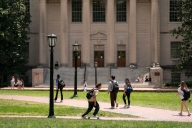You have /5 articles left.
Sign up for a free account or log in.
To combat severe budget issues, University of Arizona officials have unveiled a plan that will reduce a projected financial shortfall for the next fiscal year from $162 million to an estimated $52 million.
The shortfall was projected to be as high as $177 million before UA leaders introduced various cost-cutting measures, including a freeze on hiring, travel, compensation and construction projects, and the centralization of some departments. President Robert Robbins, who is stepping down by 2026—or before, if his replacement is hired—also took a 10 percent pay cut.
The university’s financial issues, which have drawn sharp scrutiny from Democratic governor Katie Hobbs, were caused by a flawed budget model and accounting errors, combined with overspending on strategic initiatives and what officials have called “excessive discounting” on tuition. They’ve also cited Inflation and costs related to the coronavirus pandemic as factors.
In an update at Thursday’s Arizona Board of Regents meeting, UA officials projected that $71 million will be saved through budget cuts. Of those reductions, UA Interim Chief Financial Officer John Arnold said administrative costs will be trimmed by $30.1 million, the health sciences will see $10.4 million in budget cuts, and cuts across UA’s colleges should add up to $26.1 million.
Arnold noted the numbers are not set in stone and are subject to change as the budget is finalized. Officials did not specify any job cuts that would accompany planned budget reductions across the university.
“We think these are pretty good numbers, but we’re also very nervous about putting them out this early in the budget cycle,” Arnold said at Thursday’s meeting. “We have confidence in these numbers. But we’re also confident that they’re going to change in the coming weeks.”
Beyond cuts, Arnold projected $39 million in revenue for fiscal year 2025. That influx coupled with the cuts means the university has shaved $110 million off the expected shortfall.
“This anticipated improvement of $110 million in the University’s deficit is preliminary, but marks considerable progress in the implementation of our financial action plan. This is the result of concerted efforts by deans and leaders across the University who worked diligently on their budget plans to address spending trends and to significantly reduce the deficit,” Robbins wrote in an email to campus before the board meeting.

.jpg?itok=cjynvv9F)






